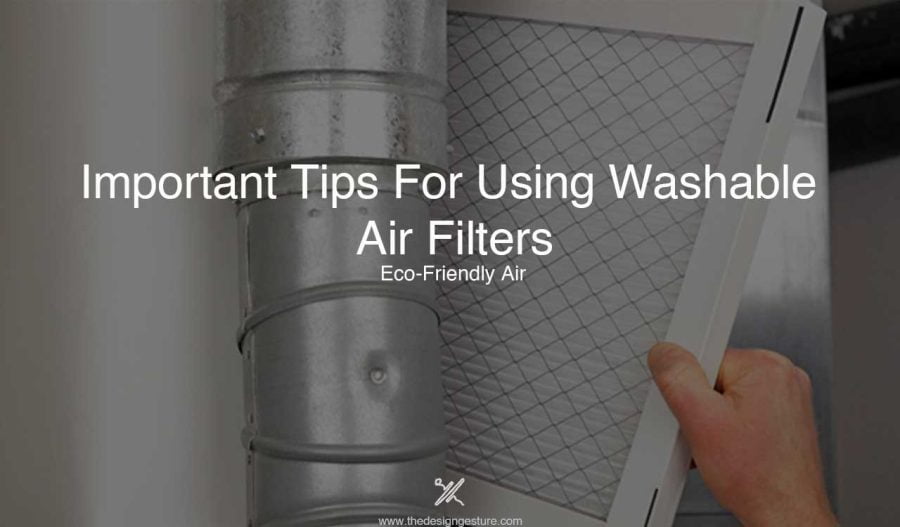In today’s fast-paced world, maintaining clean and healthy air in our homes is more important than ever. With concerns about indoor air quality on the rise, many people are searching for eco-friendly solutions to improve the air they breathe. One such solution is the use of washable air filters. In this article, we’ll explore the benefits of washable air filters and provide practical tips for using them effectively. Whether you’re concerned about allergies, pollutants, or simply want to create a healthier home environment for your family, washable air filters offer a sustainable and cost-effective solution that can make a significant difference in your indoor air quality.
Table of Contents
Understanding Washable Air Filters

Let’s start by understanding what washable air filters are and how they work. Washable air filters, also known as reusable or permanent filters, are designed to capture airborne particles such as dust, pollen, pet dander, and mold spores. Unlike disposable filters, which need to be replaced regularly, washable filters can be cleaned and reused multiple times, making them a more sustainable option for air filtration.
Compared to disposable filters, washable filters are not only more environmentally friendly but also more cost-effective in the long run. By investing in a washable filter, you can save money on replacement filters over time while reducing waste and environmental impact. Washable filters are compatible with a variety of HVAC systems and appliances, including furnaces, air conditioners, and range hoods, making them a versatile option for improving indoor air quality throughout your home.
Proper Maintenance Techniques
To ensure optimal performance and longevity, proper maintenance of washable air filters is essential. Cleaning frequency and methods are key factors in maintaining the filter’s effectiveness. Generally, washable filters should be cleaned every 1-3 months, depending on factors such as indoor air quality and usage.
When cleaning your washable filter, start by removing it from the air intake grille or housing. Use a vacuum cleaner or soft brush to remove any loose debris, then rinse the filter with lukewarm water to remove dirt and dust particles. Avoid using harsh chemicals or detergents, as these can damage the filter material and reduce its effectiveness.
After cleaning, be sure to thoroughly dry the filter before reinstalling it. Air-drying outdoors is ideal, but if that’s not possible, you can use a hairdryer on a low setting or allow the filter to air dry indoors for several hours.
Extending Lifespan and Efficiency
To maximize the lifespan and efficiency of your washable air filter, there are a few additional steps you can take. First, avoid common mistakes that can reduce filter performance, such as over-drying or using excessive force when cleaning. Follow manufacturer guidelines for cleaning and maintenance to ensure proper care of the filter.
Monitoring the filter’s performance is also important. Keep an eye out for signs of wear and tear, such as frayed edges or holes in the filter material. If you notice a decline in filtration efficiency or airflow, it may be time to replace the filter with a new one.
Eco-Friendly Practices
In addition to using washable air filters, there are other eco-friendly practices you can adopt to improve indoor air quality and reduce environmental impact. Recycling and proper disposal of old filters are important steps in minimizing waste. Many manufacturers offer recycling programs for used filters, or you can check with your local recycling center for disposal options.
Another eco-friendly practice is to reuse washable filters instead of discarding them when they become dirty. By properly cleaning and maintaining your washable filter, you can extend its lifespan and reduce the need for frequent replacements, further minimizing waste and environmental impact.
Supporting companies that prioritize sustainable manufacturing practices is also important. Look for products that are made with recycled materials, energy-efficient manufacturing processes, and eco-friendly packaging. By choosing eco-friendly air filtration products, you can make a positive impact on both your indoor air quality and the environment.
Health and Air Quality Benefits
Improving indoor air quality is not only good for the environment but also for your health and well-being. Clean air is essential for respiratory health, especially for individuals with allergies, asthma, or other respiratory conditions. By removing airborne pollutants and allergens, washable air filters can help reduce symptoms and improve overall indoor air quality.
In addition to reducing allergens and pollutants, washable air filters can also help eliminate unpleasant odors and improve ventilation in your home. With proper filtration, you can enjoy fresher, cleaner air throughout your home, creating a healthier and more comfortable living environment for you and your family.
Cost Savings and Economic Benefits
One of the key benefits of using washable air filters is the cost savings they offer over time. While washable filters may have a higher upfront cost compared to disposable filters, they can save you money in the long run by eliminating the need for frequent filter replacements. With proper care and maintenance, washable filters can last for years, providing consistent filtration and cost savings over time.
In addition to cost savings, washable air filters offer economic benefits in terms of energy efficiency. By maintaining clean air filters, your HVAC system can operate more efficiently, resulting in lower energy consumption and reduced utility bills. With the rising cost of energy, this can add up to significant savings over the life of your HVAC system.
Addressing Common Concerns
Despite their many benefits, some people may have concerns or misconceptions about washable air filters. Common concerns include worries about filter efficacy, convenience, and compatibility with HVAC systems. However, with proper care and maintenance, washable filters can be just as effective as disposable filters, if not more so. By following manufacturer guidelines and implementing proper cleaning techniques, you can ensure that your washable filter performs optimally and provides consistent air filtration for your home.
In terms of convenience, washable filters can actually be more convenient than disposable filters in the long run. While disposable filters need to be replaced regularly, washable filters can be cleaned and reused multiple times, saving you time and hassle in the long term.
Compatibility with HVAC systems is another common concern, but most washable filters are designed to fit standard HVAC units and air intake grilles. However, it’s important to check compatibility before purchasing a washable filter to ensure proper fit and function. Washable filters can also be used in a variety of household appliances, including range hoods, providing versatile air filtration solutions throughout your home.
Conclusion
In conclusion, using washable air filters is an effective and eco-friendly way to improve indoor air quality and create a healthier home environment for you and your family. By following the tips and strategies outlined in this article, you can maximize the effectiveness and longevity of your washable filter while minimizing waste and environmental impact. From proper maintenance techniques to eco-friendly practices and community involvement, there are many ways to make a positive impact on your indoor air quality and the environment. So why wait? Make the switch to washable air filters today and breathe easier knowing that you’re making a difference for both your family and the planet.
Pat Baker is an eco-conscious person, a sufferer of allergies, and a writer for kitchen appliance companies.




